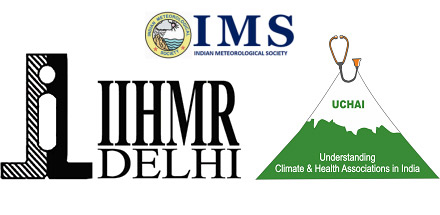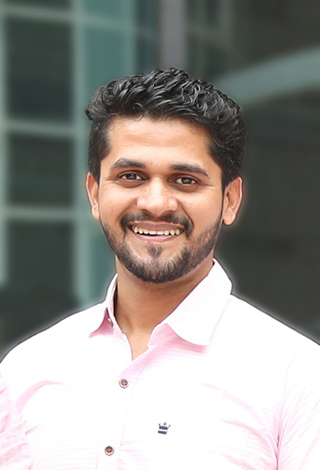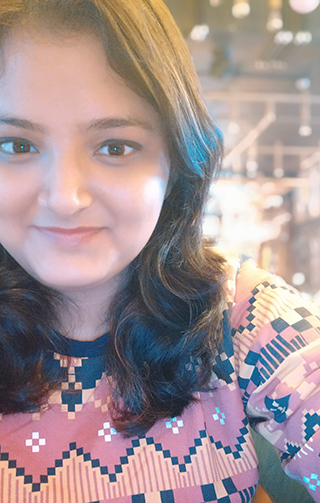By David Richards

On December 7-10, 2020, the International Institute of Health Management Research Delhi (IIHMR) and NIEHS hosted an e-conference on "Environmental Determinants of Infectious Diseases in India (Focus on COVID-19)." The e-conference, and a pre-conference mentoring workshop held a week prior, provided a platform for Indian and American researchers to explore connections among climate, the environment, and infectious diseases in relation to the COVID-19 pandemic.
A significant component of the e-conference and mentoring workshop included an educational competition for students and early career scientists to learn and apply research methodologies. Of the eight scholars, Shivam Kapoor, M.D.S., and Debanjana Moitra, B.D.S., were selected as the winners for their posters on tobacco use and COVID-19, and environmental factors and COVID-19 transmission, respectively. As winners of the Scholars' Competition, they have been invited to present their findings on an NIEHS Global Environmental Health webinar at a future date.
The Scholars' Competition consisted of lightning presentations at the pre-conference mentoring workshop. Then, following the lectures, the participants interacted with scientific mentors from IIHMR, NIEHS, the Indian Meteorological Society (IMS), and the Understanding Climate and Health Associations in India (UCHAI) initiative to refine and to re-present their projects at the e-conference.
Tobacco Use and COVID-19

"In India, tobacco is an addiction that no one talks about," said Kapoor, Technical Advisor at the International Union Against Tuberculosis and Lung Disease (The Union) in New Delhi. He continued that he is grateful NIEHS and IIHMR selected him in this competition because it elevates tobacco as a public health and environmental health issue during the COVID-19 era.
Before learning about the Scholars' Competition, Kapoor's interests and research at The Union centered on various aspects of tobacco control. In India, approximately 28.6% of the population has either smoked or chewed tobacco products. Kapoor explained in his presentation that smoking and consuming smokeless tobacco can increase the severity of respiratory illnesses due to impaired immune system and lung function. It also can be a carrier agent, meaning that through behaviors such as spitting, bringing your hand to your mouth, or littering cigarette waste, COVID-19 can aggressively spread.
Kapoor conducted a policy analysis of national, state, and district ordinances banning or limiting the sale or supply of loose tobacco products. His research highlighted singles or loose tobacco, such as individual cigarettes or thinly rolled Indian cigars called beedis, because these products are the main drivers of the tobacco epidemic and disproportionately affect marginalized communities, which have also been adversely affected by COVID-19.
"This is important during COVID-19 because looking at the economy, the sale of singles, or loose tobacco, is something we can target," said Kapoor. "It is an opportunity for the Indian Ministry of Health to focus on this one area to control the spread of the virus. We know that people who are smokers have a higher severity of this disease transmission."
The competition served as a means to enhance his research capabilities and presentation skills. Kapoor acknowledged his scientific mentors Shayak Sengupta, Ph.D. candidate and Visiting Researcher at the Centre for Social and Economic Progress, and Shivam Gupta, M.D., Associate Scientist at the Johns Hopkins Bloomberg School of Public Health, who helped him reduce the scope of his research topic into a concise message.
In addition to the mentorship opportunity from the e-conference, Kapoor noted his experience working with Rana J. Singh, M.D., Deputy Regional Director, Pranay Lal, M.Sc., Senior Technical Advisor, Amit Yadav, Ph.D., Senior Technical Advisor at The Union, and Rashmi Mehra, M.D.S., an independent researcher, on this research project.
Moving forward, Kapoor is hopeful that this and future research will help guide national and state governments to enact tobacco control regulations. "COVID-19 is a once in a lifetime event," said Kapoor. "Tobacco, and interventions to control it, is the bigger picture."
Environmental Determinants of COVID-19 Transmission

Debanjana Moitra, a post graduate student at IIHMR studying hospital management, took a broader approach. Her research examined the correlation between environmental factors, such as temperature, relative humidity, wind speed, air pollution, and ozone, and daily confirmed COVID-19 cases in Delhi.
"Delhi is a place with extreme climates," said Moitra. "I wanted to know what studies have been published on COVID-19, especially during the summer months in extreme climates. I also examined articles from China and Italy, which can experience temperature extremes."
Moitra utilized a comparative analysis of current research conducted in Delhi. To date, her findings have suggested relationships between average temperatures and wind speed with COVID-19 cases. Relative humidity and rainfall were not significantly correlated. Moitra noted that non-meteorological factors, such as worker migration, population density, and poor hygienic behaviors might also increase the number of cases. She plans to follow-up on this research.
The competition and mentorship experience proved invaluable to Moitra. Her scientific mentors, Sagnik Dey, Ph.D., Associate Professor at the Indian Institute of Technology Delhi, and Harshal Salve, M.D., Associate Professor at the All India Institute of Medical Sciences, helped Moitra focus her presentation on climate impacts confined to Delhi. In addition to the mentorship opportunity from the e-conference, Moitra acknowledged her experience working with Nitish Dogra, M.D., Associate Professor at IIHMR, on a comparative study on patient satisfaction based on the type of foodservice in hospitals in Delhi.
Moitra's interests related to COVID-19 go beyond environmental determinants to include vaccination adoption and natural disasters. She hopes to build on this experience and apply what she has learned to conduct her own primary data research in the near future.
The NIEHS Global Environmental Health Program will provide more information regarding Kapoor and Moitra's webinar presentation in the coming weeks.

